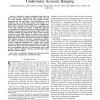Free Online Productivity Tools
i2Speak
i2Symbol
i2OCR
iTex2Img
iWeb2Print
iWeb2Shot
i2Type
iPdf2Split
iPdf2Merge
i2Bopomofo
i2Arabic
i2Style
i2Image
i2PDF
iLatex2Rtf
Sci2ools
TSP
2008
2008
Stratification Effect Compensation for Improved Underwater Acoustic Ranging
Underwater acoustic localization usually relies on time of arrival (ToA) measurements, which are then converted into range estimates. However, the water medium is inhomogeneous and the sound speed varies depending on several parameters, e.g., the temperature, pressure and salinity. As a result, sound waves do not necessarily travel in straight lines. Ignoring this stratification effect could lead to considerable bias in the range estimates. We propose a depth-based approach to compensate the stratification effect for improved underwater ranging. We assume that the sound velocity profile (SVP) is only vertically stratified, the position of the sender is known, and the receiver has a noisy depth estimate via a depth sensor. We find a numerically simple range estimator, based on reconstructing the slanted path using Fermat's Principle and calculus of variations. This estimator removes the bias and is asymptotically efficient. We compare our solution to the simplistic linear estimator...
| Added | 16 Dec 2010 |
| Updated | 16 Dec 2010 |
| Type | Journal |
| Year | 2008 |
| Where | TSP |
| Authors | Christian R. Berger, Shengli Zhou, Peter Willett, Lanbo Liu |
Comments (0)

